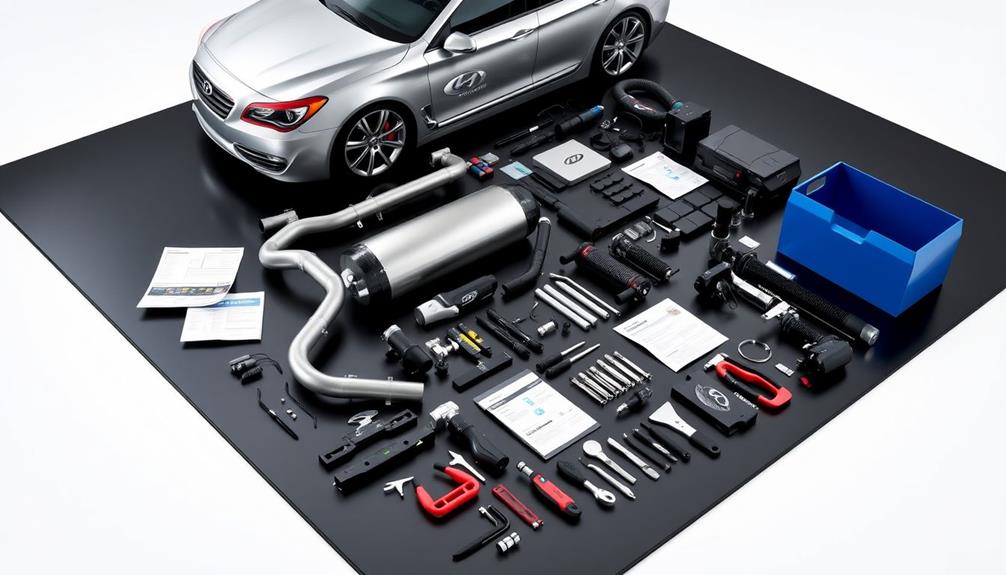You can easily transform your 2013 Hyundai Genesis into a performance powerhouse by starting with some key upgrades. Focus on enhancing the intake and exhaust systems to boost horsepower considerably. Consider turbocharger enhancements for impressive gains, pushing your car to potentially over 400 wheel horsepower. Don't forget about suspension modifications to improve handling and aesthetics. Tuning your engine with options like BTR Stage 2 will optimize performance and throttle response. With these adjustments, you'll make your luxury sedan a thrilling ride that stands out. Keep exploring for more detailed tips and insights to maximize your Genesis.
Key Takeaways
- Upgrade the intake and exhaust systems to boost horsepower to around 307 hp and enhance engine performance.
- Consider turbo upgrades, such as the Arashi kit, to significantly increase power potential up to 400 wheel horsepower.
- Implement effective tuning strategies, like BTR Stage 2 or SFR Custom Stage 1.5, for optimized throttle response and performance.
- Invest in suspension modifications, such as coilovers and sway bars, to improve handling and overall driving dynamics.
- Personalize your Genesis Coupe with aesthetic upgrades like wheel spacers and custom powdercoating for a more aggressive look.
Genesis Coupe Overview
The 2013 Hyundai Genesis Coupe is often celebrated for its impressive performance and tuning potential. With a powerful 2.0T engine churning out 274 horsepower and 275 foot-pounds of torque, you can expect a thrilling 0-60 mph time of about 5.7 seconds.
This model stands out among owners and enthusiasts, thanks to its upgraded engine and transmission, offering greater room for performance modifications compared to earlier versions.
If you're considering a turbo kit, you'll be pleased to know that the BK2 engine enhances fueling capabilities, which allows for turbo upgrades without needing injector changes. This feature simplifies your tuning journey considerably.
With the right bolt-ons, you can push the Genesis Coupe 2.0T to an impressive 400 wheel horsepower, making it a hot favorite for performance enthusiasts. Many owners even report that the stock turbo can support around 300 wheel horsepower with full bolt-ons, showcasing the model's remarkable tuning potential.
Whether you're looking to enhance your daily driver or create a track-ready beast, the 2013 Genesis Coupe offers a solid foundation for your performance aspirations.
Engine Performance Upgrades

Upgrading the engine performance of your 2013 Hyundai Genesis Coupe 2.0T can take your driving experience to the next level. With the right modifications, you can achieve an impressive output of around 300 wheel horsepower. Start by investing in a quality intake and exhaust system, then finish with a proper tune. These upgrades can yield dyno results of approximately 307 horsepower and 346 foot-pounds of torque.
To maximize your engine bay's potential, consider porting the throttle body and using custom intercooler pipes. This enhances airflow and optimizes throttle response, ensuring your engine performs at its best. If you're looking for even more power, upgrading to a Bigger turbo, like the Arashi 350 to 500 horsepower kit, can elevate your performance potential to around 400 wheel horsepower on manual transmissions.
| Upgrade Component | Benefit | Estimated Power Increase |
|---|---|---|
| Quality Intake | Improved airflow | +20-30 HP |
| Performance Exhaust | Enhanced exhaust flow | +20-30 HP |
| Throttle Body Porting | Better throttle response | +10-15 HP |
| Custom Intercooler Pipes | Increased cooling efficiency | +15-20 HP |
| Turbo Kit | Major power boost | +100+ HP |
With these upgrades, you'll transform your Genesis Coupe into a true performance powerhouse.
Turbocharger Enhancements

When you're ready to boost your Hyundai Genesis' performance, exploring turbo upgrade options is crucial.
You can choose from kits like the Arashi or TD06 SL2 to greatly increase your horsepower.
Pairing these upgrades with effective boost management strategies will guarantee you get the most out of your enhancements.
Turbo Upgrade Options
Boosting the performance of your 2013 Hyundai Genesis Coupe with turbo upgrades can transform your driving experience. While the standard turbo achieves around 300 wheel horsepower with full bolt-ons, significant gains require serious enhancements.
Consider upgrading to kits like the Arashi 350 to 500 horsepower turbo kit or the TD06 SL2 AR3 ball bearing turbo. These options can push your performance power to impressive levels, supporting outputs between 350 and 500 horsepower.
Thanks to upgraded internals and an enhanced fuel system in the BK2 engine, you won't need to swap injectors for these turbo upgrades. This means you can enjoy higher performance without concerns about idle or cold start issues.
The BK2 engine's base fuel pressure of 89 psi—compared to the BK1's 35 psi—offers a robust foundation for reliable power delivery.
With proper tuning, you can expect around 350-360 horsepower on automatic models and up to 400 horsepower on manual versions of your Genesis Coupe. Turbo upgrades not only enhance your vehicle's speed but also elevate your overall driving pleasure, making each ride exhilarating.
Boost Management Strategies
Effective boost management strategies play an essential role in maximizing your 2013 Hyundai Genesis Coupe's turbo performance. Upgrading to a larger turbo, like the Arashi 350 to 500 horsepower kit, can greatly increase power output while guaranteeing engine reliability.
However, proper boost management is imperative to prevent damaging your engine. Tuning options, such as the BTR Stage 2 or SFR Custom Stage 1.5, help optimize throttle response and overall performance, allowing you to extract the most power from your setup.
While the stock turbo can reach about 300 wheel horsepower with full bolt-ons, it's critical to balance modifications to avoid pushing the turbo beyond its efficiency limits. Consider adding methanol injection to gain an extra 40 lb-ft of torque without increasing horsepower, enhancing your overall engine performance under boost.
Additionally, monitoring boost levels and utilizing electronic wastegate control can greatly improve turbo response and prevent overboost situations. This guarantees a reliable driving experience while you enjoy the power of your tuned Genesis.
Suspension Modifications

Suspension modifications play a crucial role in enhancing both the performance and appearance of your 2013 Hyundai Genesis Coupe. Lowering your vehicle can greatly improve handling by lowering the center of gravity and reducing body roll during cornering. For peak performance, consider installing coilovers like the Silver Neomax, which offer adjustable ride heights and maintain OEM geometry to keep handling characteristics balanced.
Here's a quick overview of some key suspension modifications:
| Modification Type | Benefits |
|---|---|
| Coilovers | Adjustable height, improved handling |
| Performance Wheels | Enhanced stopping power, better aesthetics |
| Lowering Springs | Reduced body roll, improved stance |
| Sway Bars | Increased stability during turns |
Upgrading to performance wheels, such as the AC Alloy Affo2, not only enhances your car's look but also guarantees compatibility with OEM Brembo brakes for better stopping power. Investing in these suspension modifications will lead to improved responsiveness and an overall better driving experience, making them an essential aspect of your vehicle's performance enhancement.
Aesthetic Improvements

Aesthetic improvements can transform your 2013 Hyundai Genesis Coupe into a true reflection of your personal style. By implementing a few key aesthetic modifications, you can elevate your vehicle's visual appeal and create a standout presence on the road.
Start by swapping out the stock Hyundai logo for wing badges. This change adds a personalized touch that sets your Genesis apart.
Next, consider installing a Tomei bumper plug, which enhances the sporty front end while keeping a sleek design. To improve the stance of your vehicle, upgrade to wheel spacers; they push the wheels closer to the fenders, resulting in a more aggressive look.
Don't forget about your wheels! Powdercoating the stock R-Spec wheels in a custom color can give your Coupe a unique flair that grabs attention.
Finally, lower your ride with lowering springs. This not only improves handling but also contributes to a sportier profile, all while maintaining OEM geometry.
With these aesthetic improvements, your Hyundai Genesis Coupe will be custom tuned to reflect your distinct style and personality, making it a true standout on the street.
Initial Upgrade Recommendations

When you're ready to boost your 2013 Hyundai Genesis Coupe's performance, starting with a few key upgrades can make a significant difference.
These initial upgrades focus on enhancing your car's capabilities and maximizing its performance potential through bolt-on modifications.
Consider these essential upgrades:
- CNT Single Exhaust: Improves exhaust flow, enhancing overall performance.
- R2C Intake: Increases airflow to the engine, potentially raising horsepower to around 307 hp and torque to 346 tq when paired with a proper tune.
- ISIS Downpipe & Depo O2 Housing: Further enhance exhaust efficiency, helping achieve a target of 310 to 320 wheel horsepower.
In addition to these performance upgrades, you might also want to lower your vehicle with springs for better handling and aesthetics.
Adding wheel spacers can provide a more aggressive stance that complements the performance enhancements.
Don't overlook aesthetic modifications like the Tomei bumper plug and custom wing badges; these small touches can personalize your Genesis Coupe without affecting its performance.
Starting with these upgrades will set the foundation for a powerful and stylish ride.
Tuning Options Explained

When it comes to tuning your 2013 Hyundai Genesis, understanding the differences between aftermarket and custom tunes is key.
You'll want to explore various tuning strategies to maximize your car's performance and responsiveness.
Tuning Strategies Overview
Exploring tuning options for the 2013 Hyundai Genesis Coupe can release significant performance improvements, making it a popular choice among enthusiasts.
With the right modifications, you can achieve impressive performance gains without sacrificing reliability. Here are a few effective tuning strategies to take into account:
- BTR Stage 2 Tune: This option enhances throttle response and overall power, pushing your vehicle's limits.
- SFR Custom Stage 1.5 Tune: Tailored to your setup, this tune maximizes performance while maintaining drivability.
- Synapse Blow-Off Valve Upgrade: While the stock BOV works, upgrading to a Synapse BOV can boost reliability and performance.
These tuning options can elevate your Genesis Coupe's horsepower to around 307 hp and torque to 346 tq when combined with intake and exhaust modifications.
Successful tuning strategies focus on achieving performance gains while ensuring reliable modifications. It's essential to strike a balance between added power and the everyday driving experience. When exploring Hyundai Elantra 2011 tuning options, it’s important to prioritize upgrades that enhance both horsepower and fuel efficiency without compromising long-term engine health. Consider modifications like ECU remapping, suspension upgrades, or air intake improvements, all of which can provide noticeable gains. Maintaining that fine balance between performance and reliability will ensure the vehicle performs optimally in all driving situations.
Aftermarket Vs. Custom Tunes
Choosing between aftermarket and custom tunes for your 2013 Hyundai Genesis Coupe can greatly impact your driving experience.
Aftermarket tunes, like the BTR Stage 2 tune, deliver substantial improvements in throttle response and enhance overall driving dynamics. These tunes are designed to boost performance across the board, giving you a more exhilarating ride.
On the other hand, custom tunes, such as the SFR Custom Stage 1.5 tune, offer tailored adjustments that take into account your specific modifications and driving preferences. This means you can optimize your vehicle's performance enhancements based on what you want from your Genesis Coupe.
While the stock blow-off valve (BOV) is generally adequate for maintaining boost, upgrading to an aftermarket option like the Synapse BOV can improve performance and reliability.
Remember, tuning can lead to significant horsepower gains; with the right setup, like an intake, exhaust, and a proper tune, you could see around 307 hp and 346 tq on the dyno.
Engaging with the Genesis Coupe tuning community can also provide valuable insights and recommendations for the most effective tuning options.
Ultimately, the choice depends on your goals and preferences.
Cost Breakdown and Installation

Tuning your 2013 Hyundai Genesis Coupe can be a significant investment, with total costs for components and upgrades hovering around $8,737.92, while keeping your budget under $10,000 for both parts and labor.
A precise cost breakdown helps you allocate your budget effectively, ensuring you get the most out of your upgrades.
When considering installation costs, you'll find that they typically range between $700-$800. Previous installations for turbo kits have averaged around $600, so you might save by combining labor for exhaust and intake installations.
Keep in mind that additional costs may arise from tire replacements if you opt for wheel upgrades. Here's how to allocate your budget:
- Parts: $7,000
- Installation: $800
- Tire Replacement: $1,200
Local tuning options are available if specialized shops aren't accessible, giving you flexibility in managing your installation and tuning expenses.
Community Insights and Future Plans

The Hyundai Genesis Coupe tuning community has really come together, sharing insights and experiences that can help you make informed decisions about upgrades. This forum community dedicated to Genesis enthusiasts offers a rich resource for those looking to enhance their vehicles. Members frequently discuss the limitations of the plastic intake manifold, often suggesting that you consider older models for more robust modifications.
Here's a snapshot of some popular performance upgrades being discussed:
| Upgrade Type | Recommended Aftermarket Parts |
|---|---|
| Intake Manifold | Aftermarket aluminum options |
| Turbo Kits | Options from BTR |
| Wastegate Control | Electronic wastegate kits available |
| Exhaust Systems | High-flow cat-back systems |
| ECU Tuning | Custom tuning solutions |
Despite the challenges, like limited aftermarket solutions for electronic wastegate control, the community remains innovative. Personal dyno results shared by members validate the effectiveness of various performance upgrades, helping you gauge potential outcomes. Staying connected and continuously monitoring new aftermarket parts will keep you ahead in the tuning game, ensuring your Genesis remains a performance powerhouse.
Frequently Asked Questions
How Much HP Can a Genesis 3.8 Handle?
The Genesis 3.8 can handle around 400 wheel horsepower with proper modifications and tuning. If you upgrade to a turbo kit and enhance supporting systems, you could potentially reach up to 450 horsepower reliably.
How Much Horsepower Does a 2013 Hyundai Genesis 5.0 R-Spec Have?
You'll find that the 2013 Hyundai Genesis 5.0 R-Spec packs an impressive 420 horsepower. This power, combined with its luxury features, offers a thrilling driving experience that balances performance and comfort beautifully.
How to Make Genesis Coupe Pop?
To make your Genesis Coupe pop like a dazzling star, consider installing an aggressive exhaust, upgrading to performance intakes, and adding custom touches. Wheel spacers and lowering springs will enhance its stance and overall presence on the road.
Can You Turbo a Hyundai Genesis?
Yes, you can turbo your Hyundai Genesis, especially the 2.0T model. With the right upgrades, like the Arashi turbo kit, you'll boost horsepower considerably. Just don't forget to tune it afterward for peak performance.
Conclusion
As you immerse yourself in tuning your 2013 Hyundai Genesis, you'll find it's not just about performance—it's about transforming your experience behind the wheel. Coincidentally, each upgrade not only boosts power but also reflects your unique style and passion for driving. Imagine hitting the road, feeling the rush, and knowing you've crafted a true performance powerhouse. With every modification, you're not just enhancing a car; you're creating a bond that makes every journey unforgettable.










